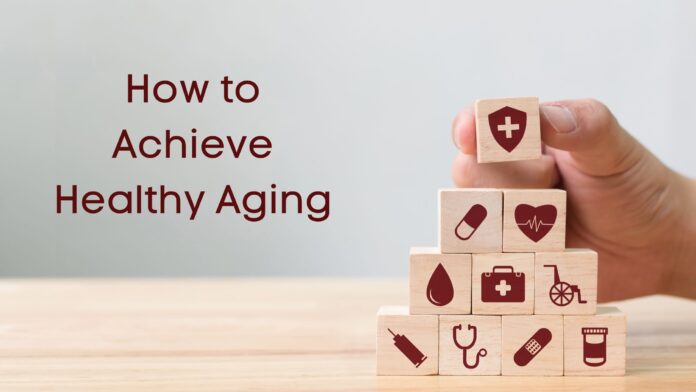Last Updated on August 16, 2023 by Shane Corbitt
Introduction to Healthy Aging
As we journey through the various stages of life, one phase that demands our utmost attention is aging. Aging, although inevitable, need not be synonymous with a decline in health and well-being.
Healthy aging is a concept that emphasizes the importance of maintaining good health and vitality as we grow older. It encompasses physical, mental, and social well-being, ensuring that we can continue to lead fulfilling lives.
Definition of Healthy Aging
Healthy aging refers to the process of growing older while preserving optimal health and functioning across multiple dimensions. It involves taking proactive steps to prevent or manage chronic diseases and maintain physical fitness, cognitive sharpness, emotional well-being, and social connections as we age.
Healthy aging goes beyond the mere absence of illness; it encompasses a state of overall well-being that allows individuals to enjoy life to its fullest potential. It involves adopting a holistic approach toward self-care and being mindful of the choices we make regarding our lifestyle habits.

Importance of Maintaining Good Health as We Age
The significance of maintaining good health as we age cannot be overstated. With advancing years, our bodies undergo changes that make us more susceptible to various health conditions.
However, investing in our health can help mitigate these risks. Maintaining good health in older age promotes independence and autonomy.
It enables us to engage in activities we love without being constrained by physical limitations or chronic illnesses. Moreover, staying healthy can enhance our overall quality of life by allowing us to continue pursuing our passions, enjoying time with loved ones, and contributing meaningfully to society.
In addition to personal benefits, healthy aging also has wider societal implications. By embracing healthy habits and actively seeking ways to maintain wellness in later years, individuals can reduce the burden on healthcare systems while contributing to a more productive and resilient society.
Nutrition and Balanced Diet
When it comes to healthy aging, nutrition plays a vital role in maintaining overall well-being. A balanced diet is about providing your body with the necessary nutrients to function optimally. Focusing on consuming fruits, vegetables, and whole grains is key to fueling your body with essential vitamins, minerals, and fiber.
Fruits and vegetables are packed with antioxidants that help combat free radicals in the body, reducing the risk of chronic diseases such as heart disease and cancer. Including a variety of colorful fruits and vegetables in your diet ensures you receive a wide range of nutrients.
Whole grains like brown rice, quinoa, and whole wheat bread provide complex carbohydrates that supply sustained energy throughout the day. In addition to fruits, vegetables, and whole grains, incorporating lean proteins such as poultry, fish, beans, or tofu is crucial for muscle repair and growth.
Healthy fats found in sources like avocados, nuts, seeds, and olive oil are beneficial for heart health. These monounsaturated fats can help lower bad cholesterol levels while promoting good cholesterol levels.
Hydration Tips for Optimal Health
Staying hydrated is often overlooked but is essential for healthy aging. As we age, our bodies may not signal thirst as efficiently as they used to.
It’s important to be conscious of our daily water intake to avoid dehydration. Aim to drink at least eight glasses (64 ounces) of water per day unless otherwise advised by your healthcare provider due to specific medical conditions or medications.
If plain water doesn’t entice you or if you need some flavor variation from time to time without adding excess sugar or calories found in sodas or fruit juices – infusing water with slices of citrus fruits (such as lemon or orange), cucumbers, or fresh herbs like mint can make for a refreshing and hydrating alternative. Additionally, be mindful of your fluid intake during physical activities or hot weather conditions.
In these situations, it’s essential to replenish the fluids lost through sweat to maintain proper hydration levels. Remember, dehydration can lead to fatigue, dizziness, and even cognitive impairment, so prioritize staying hydrated for optimal health.


Regular Exercise and Physical Activity
Exercise is more than just a means to maintain weight; it plays a crucial role in healthy aging. Engaging in cardiovascular exercises such as brisk walking, swimming, or cycling helps improve heart health and circulation while reducing the risk of chronic diseases like diabetes and high blood pressure.
Strength training exercises are essential for maintaining muscle mass and bone density as we age. It’s advisable to include resistance exercises using weights or resistance bands at least two days per week.
This helps prevent muscle loss and supports joint health and overall mobility. Flexibility exercises like yoga or stretching routines enhance joint range of motion and help prevent injuries.
Incorporating daily stretches into your routine can increase flexibility and improve posture. Additionally, balance exercises like tai chi can enhance stability to reduce the risk of falls—a common concern among older adults.
Cognitive Stimulation for Healthy Aging
Engaging in Lifelong Learning
As we age, it is vital to keep our minds active and engaged. Engaging in lifelong learning can be a wonderful way to stimulate cognitive function and promote healthy aging. One way to achieve this is by exploring new hobbies or interests.
By immersing ourselves in activities that pique our curiosity and bring us joy, we broaden our horizons and give our brains the exercise they need to stay sharp. Discovering new hobbies can be an adventure in itself.
Whether it’s learning how to paint, trying out photography, or even delving into gardening, these activities provide an opportunity for continuous growth and mental stimulation. The process of acquiring new skills and knowledge keeps our brain circuits firing and encourages the growth of neural connections, which is essential for maintaining cognitive vigor.
Taking up a New Language or Musical Instrument
Learning a new language or musical instrument is like unlocking a secret door to a whole new world of possibilities. Not only does it challenge our brains in unique ways, but also offers numerous benefits for healthy aging.
When we learn a language, we expose ourselves to different grammatical structures, vocabulary, and cultural nuances – all of which enhance cognitive flexibility and improve memory. Similarly, playing a musical instrument engages multiple areas of the brain simultaneously.
It requires coordination between hands, concentration on notes or chords, and interpretation of rhythm – all while expressing emotions through sound creation. Mental gymnastics sharpen overall cognitive function by enhancing memory retention and boosting creativity.


Mental Exercises to Improve Cognitive Function
In addition to exploring hobbies and languages/musical instruments, there are specific mental exercises that can further improve cognitive function as we age. Crossword puzzles have long been lauded for their ability to engage the mind while improving vocabulary skills and problem-solving abilities. Sudoku, a popular number puzzle game, challenges our logical thinking and enhances concentration.
The advent of technology has made it easier to access brain-training apps that offer an array of activities designed to stimulate cognitive function. These apps often include memory games, attention exercises, and puzzles that target various cognitive skills.
By incorporating these digital tools into our daily routine, we can effectively exercise our brains and maintain mental agility. Reading books or engaging in intellectual discussions are other valuable ways to keep our minds active.
Reading exposes us to new concepts, ideas, and perspectives that fuel critical thinking while enhancing vocabulary and comprehension skills. Engaging in intellectual discussions with friends or joining book clubs provides opportunities for mental stimulation through the exchange of thoughts and ideas.
By participating in lifelong learning activities such as exploring hobbies or interests, learning new languages or musical instruments, as well as engaging in mental exercises like puzzles or reading books, we can nurture cognitive stimulation for healthy aging. These activities provide entertainment and nourishment for the brain—keeping it sharp and agile even as the years go by.
Social Connections for Healthy Aging
Benefits of maintaining social relationships
Social connections are not just a source of joy and companionship; they play a vital role in healthy aging. Engaging in meaningful relationships has been linked to numerous physical and mental health benefits.
Research suggests that maintaining social connections can significantly reduce the risk of depression and cognitive decline, two common challenges faced by older adults. When we interact with others, our brains are stimulated, leading to improved cognitive function and a greater sense of well-being.
Moreover, studies have shown that individuals with strong social support systems tend to have lower stress levels, better cardiovascular health, and even stronger immune systems. So, it’s clear that fostering social relationships is an essential component of healthy aging.
Increased sense of purpose and well-being
As we age, it’s common for some individuals to feel a loss of purpose or a diminished sense of self. However, maintaining social connections can help combat these feelings and provide a renewed sense of purpose in life. Engaging with others allows us to share our experiences, knowledge, and skills while also learning from others.
It opens doors to new opportunities for personal growth and development. Additionally, when we connect with like-minded people or participate in community activities, we experience a sense of belonging, enhancing our overall well-being.


Ways to foster social connections
Joining clubs or community organizations
One way to foster social connections as we age is by joining clubs or community organizations that align with our interests or passions. Whether it’s an art club, book club, hiking group or volunteering organization – there are countless opportunities out there!
These groups provide an avenue for meeting like-minded individuals who share similar hobbies or goals. By engaging in activities together regularly—whether attending meetings, events or simply having conversations—you can establish meaningful friendships, broaden your social network, and enhance your overall well-being.
Volunteering opportunities
Volunteering is not only a noble act but also a fantastic way to forge new social connections while making a positive impact in your community. Numerous volunteer opportunities are available, ranging from working at local charities, schools, hospitals, or even animal shelters.
By dedicating your time and skills to a cause you believe in, you can meet other individuals who share the same values and interests. Volunteering allows you to make a difference and provides an environment where lasting friendships can be formed.
Staying connected with family and friends through technology
In today’s digital age, technology has made it easier than ever to stay connected with family and friends who may be physically distant. Video calls, social media platforms, and messaging apps offer valuable channels for maintaining relationships across miles. Regular communication with loved ones through these technological means ensures that distance doesn’t hinder the strength of those bonds.
Sharing updates about life events, exchanging photos, or even participating in virtual game nights or online classes together can help foster meaningful connections and combat feelings of isolation. Maintaining social connections is an integral part of healthy aging.
It offers numerous benefits, such as reducing the risk of depression and cognitive decline while enhancing our sense of purpose and well-being. By actively seeking out opportunities to engage with others through clubs or organizations aligned with our interests, volunteering our time for causes we care about, and utilizing technology to stay connected with loved ones near or far – we can cultivate robust social networks that contribute greatly to our overall health as we age.


Preventive Healthcare Measures for Healthy Aging
Regular Check-ups and Screenings
Regular check-ups with your healthcare provider are essential for maintaining good health as you age. These visits allow your doctor to monitor your overall well-being, identify any potential health issues early on, and make necessary interventions.
During these check-ups, your doctor may perform various screenings and tests to assess your risk factors for age-related conditions such as heart disease, diabetes, and certain types of cancer. Following their recommendations regarding mammograms, colonoscopies, bone density tests, and other preventive screenings is important.
Managing Chronic Conditions
For those living with chronic conditions such as hypertension, diabetes, or arthritis, managing these conditions is key to healthy aging. Regularly monitoring blood pressure levels or blood sugar levels and following the prescribed treatment plan are vital in preventing complications and optimizing overall well-being. It is essential to stay in close communication with your healthcare team regarding any changes in symptoms or medication adjustments.
Conclusion
Achieving healthy aging requires a proactive approach toward one’s physical well-being as well as mental and emotional health. By adopting a balanced diet rich in nutrients, and prioritizing regular exercise routines tailored toward individual abilities and interests while ensuring ample restorative sleep time, individuals can significantly enhance their quality of life as they grow older. Engaging in cognitive stimulation through lifelong learning and mental exercises can help maintain mental acuity and prevent cognitive decline.
Moreover, fostering social connections with others through social activities, volunteering, or staying connected with loved ones strengthens one’s support network and promotes overall well-being. By embracing preventive healthcare measures such as regular check-ups and effectively managing chronic conditions, individuals can minimize the risk of developing age-related diseases and maximize their potential for healthy aging.
Remember, it’s never too late to start making positive changes for your health. With the right mindset and commitment to self-care, you can embrace the aging process with grace and vitality.
Ever wondered about the deeper meaning of overall well-being? Dive into our enlightening piece on What is Holistic Health to unravel the essence of complete wellness. Then, journey through the remarkable findings on The Impact of Social Connections on Health and Longevity and discover the silent secrets of a long, vibrant life.










